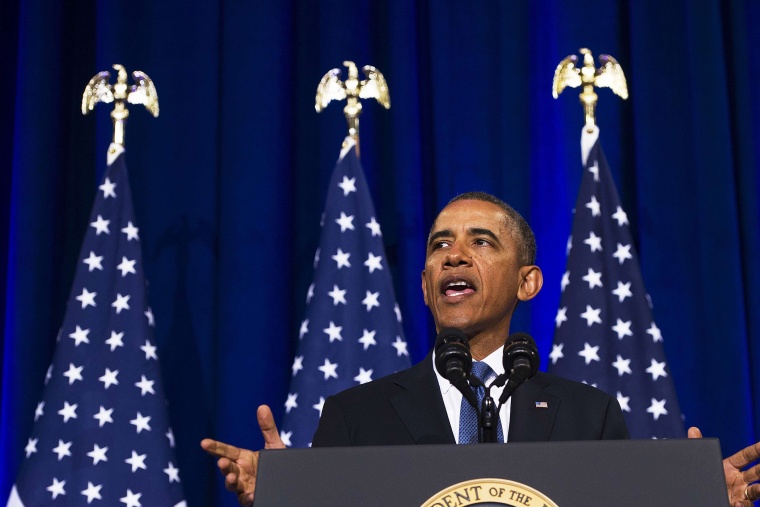President Barack Obama on Friday announced significant changes to the way the National Security Agency collects communications data, but those reforms stop short of what privacy advocates wanted.
Speaking at the Justice Department, Obama acknowledged critics who said that surveillance authorities could be abused. He also strongly defended the intelligence community.
"I would not be where I am today were it not for the courage of dissidents, like Dr. King, who were spied on by their own government," Obama said. "As a president who looks at intelligence every morning, I also can’t help but be reminded that America must be vigilant in the face of threats."
Obama announced that the Foreign Intelligence Surveillance Court judge will now have to approve queries to the database holding information collected under Section 215 of the Patriot Act. Currently, the agency can acquire telephone communications records in bulk with a court order, but the NSA does not require judicial approval to search the database. The requirement to seek the approval of a judge will go into effect immediately, even without legislation from Congress.
RELATED: Here’s what Obama should do about the NSA
"The question is whether the court is going to be more suspicious and more demanding of the NSA than the NSA would be of itself," says Stephen Vladeck, a law professor at American University. "The only thing we know for sure is it won't be less suspicious."
The president also said that the NSA should no longer hold the data, but he stopped short of saying that it should not be collected at all. Obama recommended that the attorney general and intelligence community work together with Congress to decide how the data should be held.
"I think these are steps in the right direction; of course, the devil will be in the details," said Michelle Richardson of the American Civil Liberties Union. A key question is what legal standard will be required for querying data under the president's proposal. Currently, the NSA is allowed to make three "hops" from the target of a query -- that is, they are allowed to analyze the records not only of a target, but those of parties three degrees of separation from the target. The question, Richardson says, is "when you go get your court order, are you still grabbing millions of people's records at a time?"
Obama said Friday that the agency would be limited to searching records two "hops" from a target, rather than three.
"This is without a doubt the most significant reforms in our surveillance programs since President Obama took office," a senior administration official told reporters on a conference call Friday morning ahead of the president's speech.
Other changes Obama proposed include a panel of attorneys who would argue significant cases before the Secret Foreign Intelligence Surveillance Court and an easing of the gag orders that come with the issuance of national security letters. National security letters allow the government to seek business records without a warrant, and to prevent the recipient of such a letter from revealing publicly that they have received one.
Obama proposed increased restrictions on how the government gathers data on foreign persons, including limiting the length of time that data can be retained and how it can be used. Obama announced that he has asked Attorney General Eric Holder to examine ways to prevent "accidental" collection of Americans' data under Section 702 of the Foreign Intelligence Surveillance Act, which governs when and how the U.S. collects intelligence on non-Americans abroad.
The president's recommendations come after the NSA's data gathering has faced weeks of harsh criticism, with the White House's own surveillance panel saying the program should be overhauled and a federal court judge ruling that the metadata program was likely unconstitutional. Intelligence officials have insisted that the program is essential to protecting the country, but many lawmakers, a federal judge, and even the president's panel have not been convinced that the program is essential to the fight against terrorism.
Yet the president may not have the final say. Most of the changes privacy advocates are seeking can only be done through Congress, and the most popular bill supported by civil liberties activists, authored by Wisconsin Republican Rep. Jim Sensenbrenner and Vermont Democratic Senator Patrick Leahy, would go further than what the president is proposing. The Sensenbrenner-Leahy bill would essentially end bulk collection of data by raising the legal standard by which the government can request the data, rather than raising the standard under which the data can be queried after it is acquired. The bill also makes more sweeping changes to other surveillance authorities than what Obama has recommended.
Congress could craft a bill along the lines of the president's recommendations, or it could proceed with more far-reaching reforms.
"The USA Freedom Act has continuously gained momentum and we remain confident that if brought up for a vote, it will pass," Ben Miller, a spokesman for Sensenbrenner, told msnbc Thursday. "We think it is the best solution for reining in the NSA and restoring trust in the intelligence community."
Yet whatever happens, the president's concessions to civil liberties activists signify a profound shift as result of the leaks facilitated by former NSA contractor Edward Snowden, whose leaks to the media first revealed the scope of the agency's data collection. When that information first leaked, Obama said he "welcomed" the argument over surveillance policy. But without Snowden, that conversation would have never happened.
